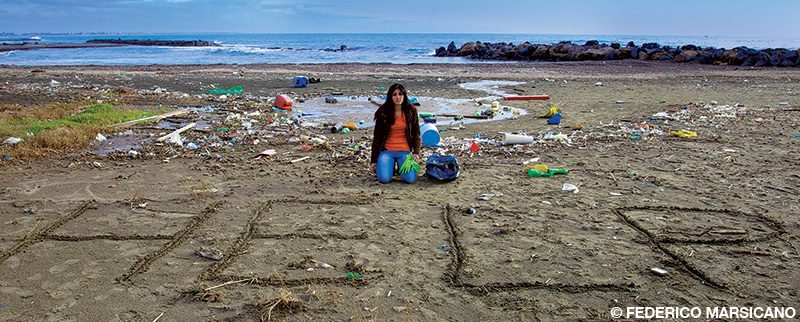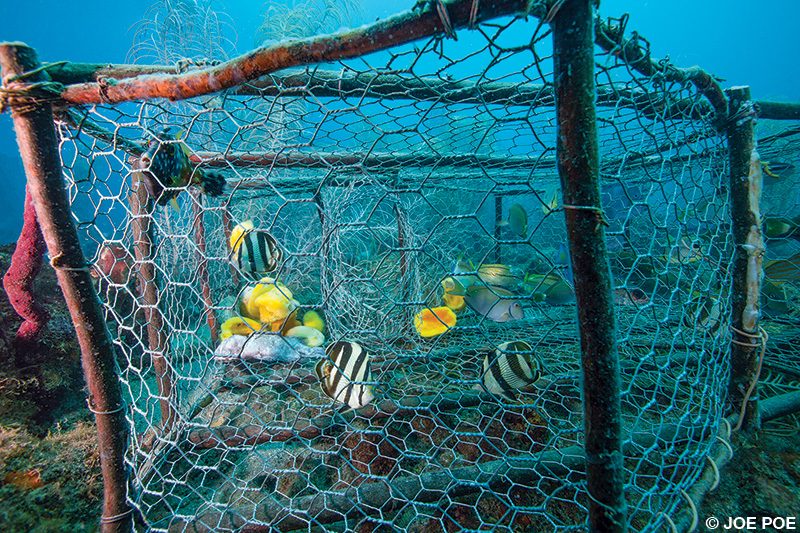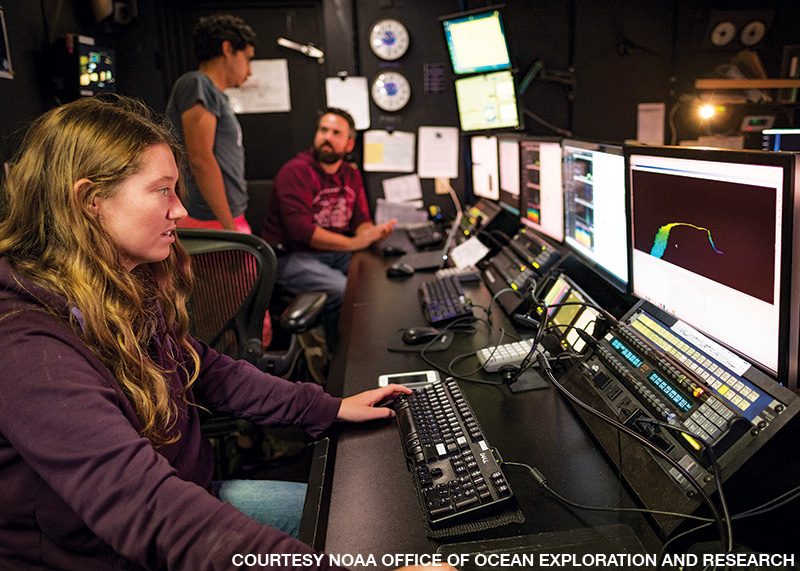The U.N. Decade of Ocean Science for Sustainable Development
The ocean affords humanity some stunning sights, such as crystal-clear water that extends into a seemingly endless aquamarine horizon and crashing waves that mesmerize as they tempt you to come closer for a better look. Dive in and explore magnificent creatures reminiscent of those described in science-fiction novels and some of the largest, most vibrant living organisms offering food and shelter for other marine animals.
Long a highway for humanity and economic development leading to prosperity and richness of life and lifestyle, the ocean supports countless ecosystem services that have allowed us to develop and sustain our way of life. Today the ocean provides food security, the oxygen we breathe, carbon storage, storm surge mitigation and numerous recreational opportunities — including the escape and serenity divers find while exploring the intrinsic beauty and ever-changing vastness of the underwater depths.
Unfortunately, the ocean is increasingly riddled with marine debris and microplastics, biodiversity in the sea is declining, harmful algal blooms increasingly besiege the coasts, the ocean is warming, and seawater is becoming more acidic. Human activity is compromising the sustainability of human use of the ocean.

In 2016 the first United Nations World Ocean Assessment found that the world’s oceans are becoming seriously degraded. Human utilization of the ocean, rooted in industrial practices developed in the past century, is harming its future productivity. With the stress of today’s 7.8 billion people on Earth expanding to a projected 8.5 billion in 2030, we need to make changes. To have an ocean capable of healthfully and prosperously supporting a growing population, it’s necessary to have sustainable development with circular and recycling economies that will eliminate wasted byproducts of production and the impacts on the air and the ocean.
With this challenge in mind, UNESCO’s Intergovernmental Oceanographic Commission (IOC) proposed a campaign of ocean science to inform sustainable development. The U.N. General Assembly approved this proposal, declaring 2021-2030 as the United Nations Decade of Ocean Science for Sustainable Development (the Decade) and charging the IOC with developing an implementation plan for the Decade to include all U.N. agencies and provide “the science we need for the ocean we want.”
The IOC has outlined the following main outcomes as goals for the Decade:
- a clean ocean where sources of pollution are identified and removed
- a healthy and resilient ocean where marine ecosystems are mapped and protected
- a predicted ocean where society has the capacity to understand present and future ocean conditions
- a safe ocean where people are protected from ocean-related hazards
- a productive and sustainably harvested ocean ensuring the provision of food supply and stable livelihoods
- a transparent and accessible ocean with open access to data, information and technologies
- an inspiring and engaging ocean where society understands and values the ocean in relation to human well-being and sustainable development.
These ambitious outcomes address both the scientific concerns for the ocean and the U.N.’s Sustainable Development Goals of 2030. The Decade will be more than a lot of curiosity-driven science for general understanding; it will be purposeful and target solvable problems. Because of the sheer magnitude of the issues facing our ocean, the Decade is much larger than any one nation or organization and will require substantial amounts of collaboration, coordination and partnerships.

To achieve sustainable development, the Decade will rely on input and involvement from a diverse set of stakeholders including scientists, policymakers, nongovernmental organizations, private industries and public citizens. To make the biggest impact, these groups must transcend geographies and disciplines to work together to design the science necessary for actionable solutions that will meet their needs.
Consider the current state of ocean knowledge. As researchers find new species, challenges arise to understand their roles and functions in the ecosystem. Pelagibacter ubique, for example, a new genus and species of bacterium identified in 2002, is one of the smallest and most globally abundant organisms in the sea. It is responsible for breaking down organic matter in the ocean, releasing nutrients to allow further photosynthesis — making oxygen from light through plankton. How will this bacterium function in a warming and increasingly acidic ocean environment?
Researchers have mapped only 15 percent of the world’s oceans using current bathymetric technology; the remainder of what we see in world maps is a blend of artistic creativity and satellite-derived features that are often erroneous. There is much to discover, learn and apply to sustainable-development solutions.
When the world took notice of the ocean and planetary environment in the 1960s and ’70s, the result was a suite of environmental laws that protected our environment and didn’t cripple the economy: the Clean Air Act, Clean Water Act, National Marine Sanctuaries Act, National Environmental Policy Act, the Superfund program and others. Many other nations enacted similar protections, and our air and water became cleaner. The environment is continuing to degrade, however, and now the challenges are grander in scale.
The IOC has established the starting point of the Decade with the following goals: finally mapping entire the ocean; establishing a global ocean-observing system in every ocean basin to monitor the health and changes in the ocean; exploring and defining the ecosystems of the ocean from microorganisms to whales; establishing a truly global hazard-warning network for tropical cyclones (hurricanes), tsunamis and severe storms; providing an ocean data portal that unifies and consolidates authoritative ocean information for all; and developing and sharing the capacity to use and understand ocean science information across all nations, which will enable informed decision-making by citizens and policymakers. These and other goals are just the beginning; more objectives will be added as the Decade progresses.

Divers can help by incorporating citizen science into their dives. Resources are available online that outline how you can turn your passion for diving into useful data for marine science and local communities. Consider joining reef fish surveys or marine debris cleanups, for example. Photograph and document the underwater conditions of favorite dive sites, and continue to monitor these locations during the Decade and beyond.
While science and technology are a large part of the foundation for the Decade, we also need substantive changes to the current relationship between people and the ocean. Integral to the Decade’s success is the implementation of effective communication and engagement to persuade lawmakers, policymakers, scientists, benefactors and society that large-scale, transformative change must occur. An ocean literacy campaign is aimed at education and behavioral changes by broadening the understanding of the ocean’s economic, social and cultural values.
The biggest opportunities of the Decade are public awareness and the chance to create a global sense of ocean-mindedness. You can help by talking about the Decade and the importance of the ocean, reaching both within and beyond your own circles. Educate your dive buddies, clients and new divers you encounter, and advocate to nondivers for more sustainable ocean practices. The success of the U.N. Decade of Ocean Science for Sustainable Development and thus improving the state of the ocean depend on you making your voice heard.
For more information about the U.N. Decade of Ocean Science for Sustainable Development, see oceandecade.org.
About the authors: Tiffany Atkinson, M.Sc., is a John A. Knauss Sea Grant Marine Policy Fellow resident with Oceanic and Atmospheric Research at the National Oceanic and Atmospheric Administration (NOAA). Craig McLean, a DAN member who began diving in 1972, is the NOAA assistant administrator for research and the head of the U.S. delegation to the IOC.
Explore More
Watch this video to learn more about the Decade of Ocean Science for Sustainable Development.
© Alert Diver — Q3/Q4 2020